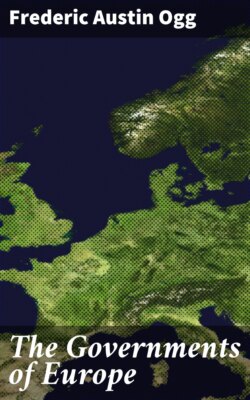Читать книгу The Governments of Europe - Frederic Austin Ogg - Страница 55
На сайте Литреса книга снята с продажи.
POLITICAL PARTIES I. Parliamentarism and the Party System
Оглавление150. Government by Party.—Intimately connected with the parliamentary scheme of government which has been described is the characteristic British system of government by party. Indeed, not merely is there between the two an intimate connection; they are but different aspects of the same working arrangement. The public affairs of the kingdom at any given time, as has appeared, are managed by the body of ministers, acting with and through a supporting majority in the House of Commons. These ministers belong to one or the other of the two great political parties, with only occasional and incidental representation of minor affiliated political groups. Their supporters in the Commons are, in the main, their fellow-partisans, and their tenure of power is dependent upon the fortunes of their party in Parliament and throughout the country. They are at once the working executive, the guiding agency in legislation, and the leaders and spokesmen of this party. Confronting them constantly is the Opposition, consisting of influential exponents of the contrary political faith who, in turn, lead the rank and file of their party organization; and if at any time the ministers in power lose their supporting majority in the Commons, whether through adverse results of a national election or otherwise, they retire and the Opposition assumes office. The parliamentary system and the party system are thus inextricably related, the one being, indeed, historically the product of the other. It was principally through the agency of party spirit, party contest, and party unity that there was established by degrees that single and collective responsibility of ministers which lies at the root of parliamentary government; and, but for the coherence and stability with which political activity is invested by party organization, the operation of the parliamentary system would be an impossibility. The law of the British constitution does not demand the existence of parties; on the contrary, it affords them no recognition or place. The conventions, however, both assume and require them.
151. Two-Party Organization.—The relationship which subsists between parliamentarism and party government is to be accounted for in no small measure by the fact that the number of great parties in the United Kingdom is but two. Certain continental nations, notably France and Italy, possess the forms of parliamentary government, adopted within times comparatively recent and taken over largely from Great Britain. In these countries, however, the multiplicity of parties effectually prevents the operation of the parliamentary system in the fashion in which that system operates across the Channel. Ministries must be made up invariably of representatives of a number of essentially independent groups. They are apt to be in-harmonious, to be able to execute but indifferently the composite will of the Government coalition in the popular chamber, and, accordingly, to be short-lived. Despite the rise in recent decades of the Irish Nationalist and Labor groups, it is still true in Great Britain, as it has been since political parties first made their appearance there, that two leading party affiliations divide between themselves the allegiance of the mass of the nation. The defeat of one means the triumph of the other, and either alone is competent normally to govern independently if elevated to power. This means, on the one hand, a much more thoroughgoing predominance of the governing party than can be acquired by a single party in France or Italy and, on the other hand, a unique concentration of responsibility and, in turn, an increased responsiveness to the public will. The leaders of the one party for the time in the ascendancy govern the nation, by reason of the fact that, being the leaders of this party, they are selected without doubt or equivocation to fill the principal offices of state.[210]
